Summary of a capitalisation workshop with teachers and school inspectors, 13-14 April 2013, CEM in Hann, Senegal
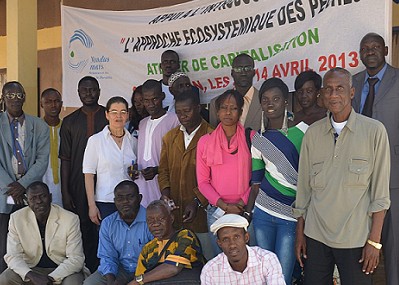 Several schools in Senegal have tested teaching aids for the ecosystem approach to fisheries. This was part of the pilot activities developed by Mundus maris for the EAF Nansen Project of FAO. They decided to continue working on the contents after the end of the tests in July 2012. The materials are now freely available for downloads. After several months in the new school year of pursuing a variety of follow-up initiatives, it was time to get together to compare experiences. For the occasion, Mundus maris offered a moderated conversation space for interested directors, teachers and school inspectors. While their respective roles are different, they shared an interest in exploring which experiences could be considered for wider use, preferably in an institutional setting and not only on a local ad hoc basis.
Several schools in Senegal have tested teaching aids for the ecosystem approach to fisheries. This was part of the pilot activities developed by Mundus maris for the EAF Nansen Project of FAO. They decided to continue working on the contents after the end of the tests in July 2012. The materials are now freely available for downloads. After several months in the new school year of pursuing a variety of follow-up initiatives, it was time to get together to compare experiences. For the occasion, Mundus maris offered a moderated conversation space for interested directors, teachers and school inspectors. While their respective roles are different, they shared an interest in exploring which experiences could be considered for wider use, preferably in an institutional setting and not only on a local ad hoc basis.
The Senegalese school inspection services are since some time engaged in strengthening environment education in the national curriculum. But it's not trivial to develop and roll out throughout the country. Initiatives, which fit into the departmental and national planning of the inspection services, are therefore candidates for possible integration into the institutional set-up.
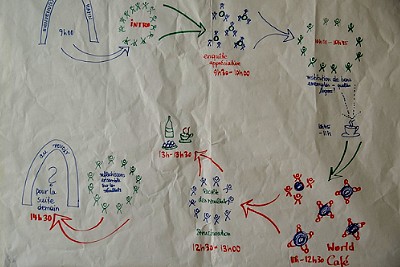 The moderation team was composed of Aliou Sall and Cornelia E Nauen. They welcomed the participants in the Collège d'enseignement moyen (CEM) in Hann, part of the greater Dakar urban agglomeration and host to the workshop.
The moderation team was composed of Aliou Sall and Cornelia E Nauen. They welcomed the participants in the Collège d'enseignement moyen (CEM) in Hann, part of the greater Dakar urban agglomeration and host to the workshop.
To mark the difference to a conventional seminar, the flow of the day was pictured and explained so as to make the participants feel at ease from the beginning and take full advantage of the conversation space at their disposal.
The ice-breaker was the opening circle with everybody explaining briefly their background and expectation. Next was an appreciative enquire about the best experience each participant had had in the last few years in environmental education or a related area.
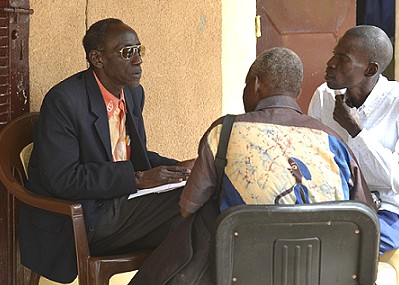
In groups of three, participants tell each other the story of their best experience. Each member of the group acts in a different function in three short rounds of 10 minutes each: as story teller, as documentalist taking note in a worksheet provided or as reporter asking clarifying questions. To respect the timing, the story telling as well as the probing questions and reporting had to be focused and sharp. The reporting covered three aspects:
- An abstract of the story itself;
- What made the experience successful?
- Why was the story a success?
All participants gathered afterwards in the open circle and three volonteers were asked to summarise the story and its success factors for the benefit of the plenary. Clarifying questions from the audience were encouraged. The key points were then recorded on the wall as part of the group production.
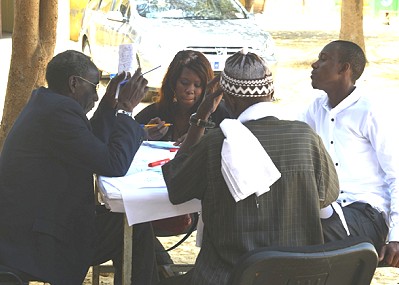
After the well-deserved break with snacks, the next conversation focused upon the suggestion of a participant on the challenge to multiply such a good exerience. This important question was debated in world café style in groups of four or five persons in three rounds of rotations at all tables.
The etiquette had been duly explained and was also available in printed form at each table. After each round of 20 minutes only the table host remained, while the others rotated to another table. This way, almost everybody could listen and speak to everybody else and contribute to teasing out the key issues.
Towards the end of the last round of conversation, each table was provided with cards and invited to jot down the principal points from the conversation, one concept or idea per card.
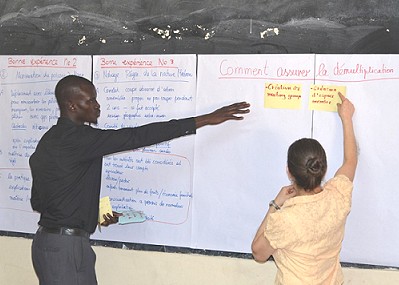 Volunteers were then invited to come forward to speak the cards of their table and help put them into a logical structure, helped by all other participants.
Volunteers were then invited to come forward to speak the cards of their table and help put them into a logical structure, helped by all other participants.
After sticking the cards of the first table on the wall, the next tables completed with their concept cards, which had not yet been covered by previous speakers. Comments from the floor further sped up the structuring process so that a rather complete picture emerged out of the group work which actions, attitudes and resources were required to achieve the objective. The objective was to multiply successful examples of connecting teaching and learning at school with the social, economic and environmental concerns of society.
During the check-out round before closing the day's work, participants said how surprised and pleased they were with their production. They felt what was on the wall reflected their collective experience so far quite well.
They highlighted in particular that they did not have to suffer under disciplinary strain, but had found the working mode quite entertaining and enjoyable in addition to being obvously quite productive.
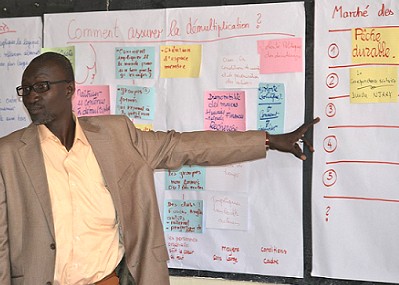
At that point, nothing else was left than to invite them to think overnight about how they might wish to use their newly found metaanalysis in divising new projects or initiatives for the future and to wish them a relaxing rest of the day.
The second day of the workshop was entirely focused on the future. Following on from the check in, an ideas market was thrown open. Participants were invited to write down the title of a project they would like to implement in the near future. Then, on a first come first serve basis, the promoters of up to five project proposals were invited to pin their idea on the wall and make a sales pitch so as to attract other participants to come to their conversation table and help elaborate the idea.
The way to dig deeper into the implementation challenge for the projects put forward in the market of ideas was a pro-action café.
The principal difference to the already practiced world café format is that the promoters and table hosts were to take a few minutes break between the second and third round of the conversation to jot down the three major activities that needed to happen in the coming three months to implement their project. This mini-action plan was then to be discussed further during the last conversation round and reported back to the plenary.
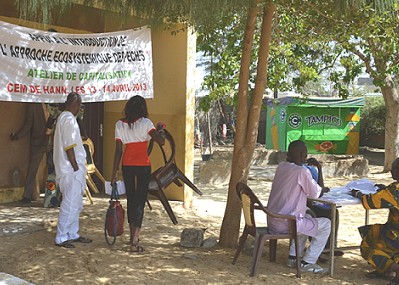
The promoters then went to their tables to start the first round of the conversation with more explanations about their project idea and probing questions and comments from those joining.
The moderators kept the time for the group. At the end of the first round, they invited all those not serving as project promoters and table hosts to move on to the next table. The new arrivals were, of course, to be briefed by the table host and then discuss critically, what might still be missing in the project formulation.
For the last round, no more rotation was required, rather, the previous configuration of people discussed the three key points of the promoter's draft action plan drafted between the second and third round.
Shortly before finishing their conversation, the promoters were asked to summarise the results of their work in poster format with the help of the participants at their table. As the break with fruit and other snacks was set between the end of the group discussion and the sharing of results in the plenary, laggards had time to finish their posters and catch up.
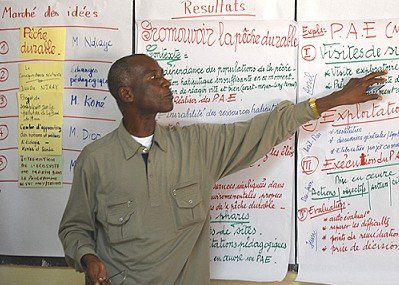 At the end of the break, everybody was invited back into the open circle.
At the end of the break, everybody was invited back into the open circle.
The promoters then stepped forward one by one and explained the key points of their action plan vetted by their group.
The floor was, of course, welcome to comment, ask additional questions and help sharpen the action points, where necessary.
There was no need for the moderators to insist as questions and comments were freely going forwards and backwards.
The last project to be presented touched on the challenges and opportunities to institutionalise some of the experiences from the earlier pilot activities. That group had also looked at the type of obstacles that had to be overcome.
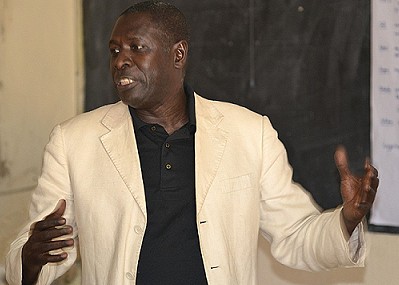
That was the perfect bridge to the final phase of the forward looking part of the workshop, namely to explore institutionalisation.
The inspectors explained broadly the balance between more central orientations and teacher support and the space allocated to connecting teaching content to local base organisations and initiatives.
The teachers were very much at ease with this approach, given that several of them already work with these base organisations, where they are active and functional.
They also have an interest to see any good existing initiative multiply thanks to its institutionalisation, where possible.
The key points for successful institutionalisation were highlighted in the conversation and documented in a specific poster for further use.
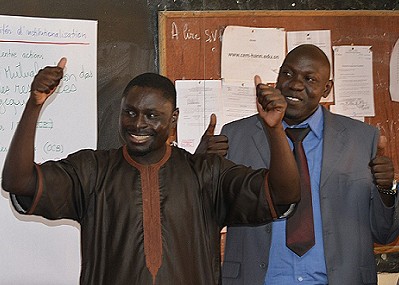
This brought the substantive conversations to a successful conclusion.
The final evaluation by the participants was then simplified to remain roughly within the time allocation. Instead of filling in a questionnaire or some other written record, the moderators invited them to show with thumbs up or down how they felt about the workshop at the end.
The smiles suggest, they did not regret to give up a good part of their weekend for the workshop.
After this, all the moderators had to do was to thank everybody for their excellent participation and wishing them a safe trip back to their respective homes.
Immediately afterwards, the moderators also produced a newsletter about the major steps and the output of the workshop, which was distributed in electronic form to the participants.








